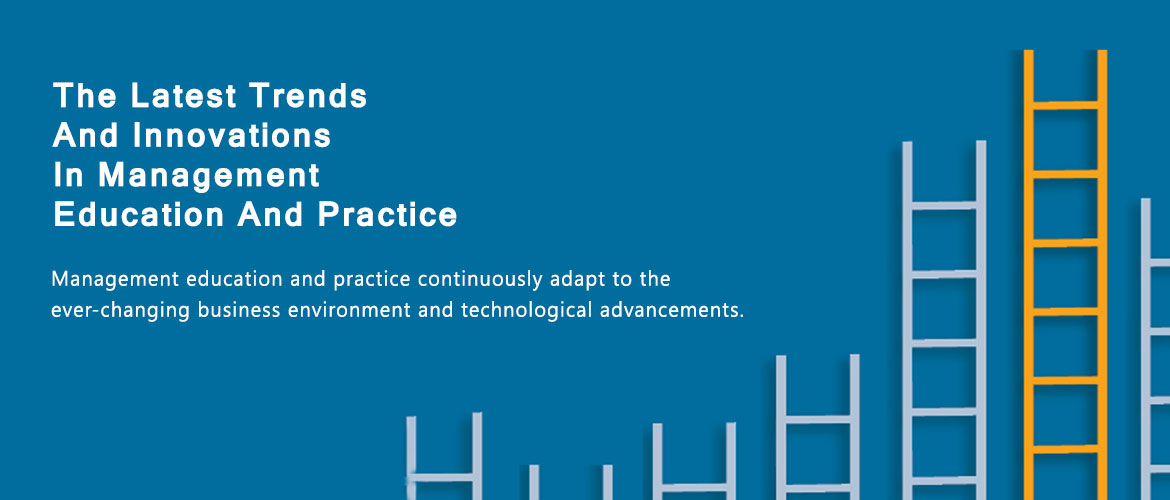


Despite facing economic hurdles, worldwide crises, and increasing interest rates, businesses have discovered unanticipated avenues for expansion. Technology-oriented start-ups have been at the forefront of economic resurgence and sustained profitability amid these adverse circumstances. This has led to enduring modifications in management education. To maintain relevance, business schools with PGDM and MBA management courses are now aligning with contemporary business and societal needs. The evolution of technology and global occurrences necessitate a reassessment of the present state of education.
Pioneering developments in areas such as AI, AR, VR, big data, analytics, cloud computing, and IoT have drastically transformed the educational landscape. A swift digital transformation has taken place in the education sector, leading to a shift towards online and cloud-based platforms at all levels. With a projected value of $680 million by 2027, the EdTech sector is propelled by mobile technology, cloud services, and virtual reality – ultimately resulting in more accessible education, devoid of location or time barriers.
Management education and practice continuously adapt to the ever-changing business environment and technological advancements. Below are some of the most recent developments and innovations in this field:
Online learning platforms, MOOCs, and virtual classrooms have made management education accessible worldwide. These flexible options enable professionals to enhance their skills without compromising their careers.
This approach delivers content in small, manageable modules tailored for busy professionals who prefer quick learning sessions to immediately apply newfound knowledge in their roles.
This method merges traditional classroom teaching with online learning components, maximizing the advantages of in-person interaction and digital resources.
Management education now increasingly incorporates hands-on experiences, case studies, simulations, and real-world projects to offer practical insights and skill application.
The inclusion of data analytics and AI in management curricula equips students with the skills needed to analyze big data, make data-driven decisions, and comprehend AI's business implications.
There is an increasing emphasis on integrating sustainability and ethical considerations into management education, highlighting the growing significance of social and environmental responsibility in business practices.
Communication, emotional intelligence, teamwork, and adaptability have become integral essential skills for effective management and leadership.
As businesses globalize, management education focuses more on preparing students to thrive in diverse and cross-cultural environments.
The integration of agile methodologies and design thinking principles into management education fosters innovation, problem-solving, and adaptability.
Contemporary leadership programs aim to cultivate a new generation of inclusive, empathetic leaders capable of navigating complex challenges.
By utilizing VR and AR technologies, students can engage in immersive learning experiences, such as virtual business simulations and leadership scenarios.
Educational content is enhanced with gamification elements like leaderboards, badges, and interactive challenges to captivate learners and create a more engaging experience.
Adaptive learning technologies track student progress and customize learning paths according to each individual's strengths and areas for growth.
The increasing partnerships between educational institutions and industry players grant students valuable real-world insights, internships, and knowledge of current business practices.
As lifelong learning gains momentum, professionals are encouraged to regularly enhance their skills to remain competitive in an ever-evolving job market.
With the rise of remote work, management education incorporates effective tools and strategies for seamless virtual teamwork and collaboration.
Programs centered on stress management, mindfulness, and well-being are integrated to support students' emotional and mental health.
Recognizing the growing importance of blockchain technology and cryptocurrencies, some management programs now include courses on these topics.
Educational institutions establish innovation hubs and incubators to encourage entrepreneurship while assisting students in launching their ventures.
Students benefit from easy access to course materials, evaluations, and interactive content through e-learning platforms and mobile apps on their devices.
The aforementioned tendencies embody the progressive requirements of enterprises and learners in a vibrant, digital environment. By keeping abreast with these emerging trends, both educators and professionals can adeptly traverse the continuously shifting terrain of management studies and their application.

From the very depth of my heart I would like to thank Kazian Education for their complete guidance in supporting me to choose my career path. At first I was completely clueless but with the passage of time I became very confident and proud to be a part of Kazian Education.

I wanted to take the time to thank Kazian and team for everything they have done for me .Your support has been greatly appreciated. Thanks to Kazian and your entire team for all the support and contribution. All The Best .

I am really very very glad to share with everyone about my excellent experience with Kazian Education whose guidance actually helped me to make my career path more clear and firm. Thanks to the entire team of Kazian whose care and support helped me to reach my goal. All the very best to Kazian and the team .

Honestly speaking I was really very very confused with my career as well as my goals but then Kazian Education came into picture whose presence in my life actually did it for me by making my vision much more clear and making me what I am actually here today.

Co-ordinate in-charge of Men’s Clinic @Centre for Infectious Disease Research in Zambia (CIDRZ). He is the Author of Research Guidelines which is meant for both Postgraduate and Undergraduate students. He is a Member of the Kazian School of Management advisory Board since 2014 in India.

I just wanted to share a quick note and let you know that everyone @ Kazian is doing really a good job. I'm glad I decided to pursue my program through Kazian Education. It’s really felt great when your counselor keeps in touch with you in each and every phase of your path. Thanks!!

C.S.C.E.C( Middel East) L.L.C

DXC Technology

Larsen and Toubro Limited

Centre for Infectious Disease Research in Zambia (CIDRZ)

Owner of EL Magnifico

Capital Den Advisory LLP